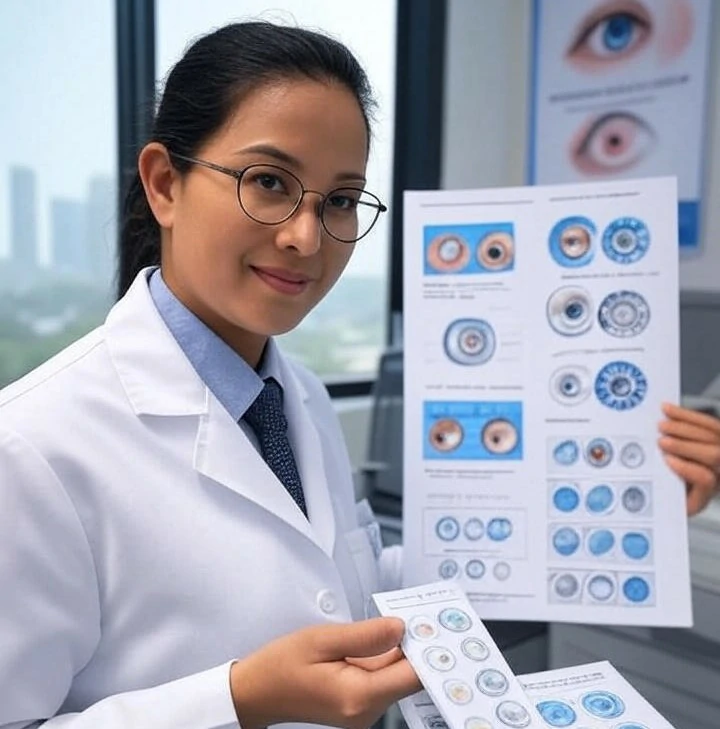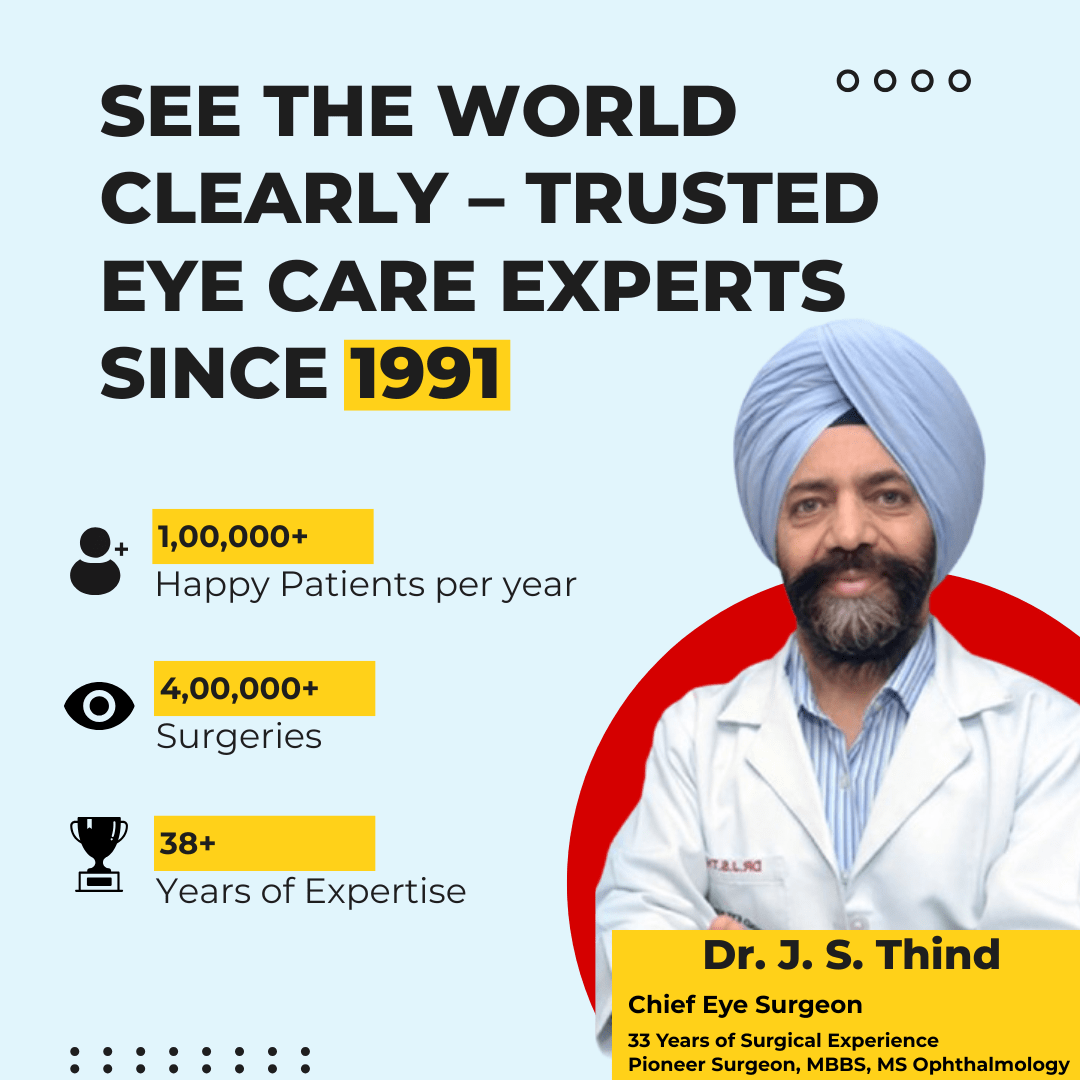Contact lenses have revolutionized vision correction for millions worldwide. For those who find glasses inconvenient or restrictive, contact lenses offer comfort, enhanced aesthetics, and sharper peripheral vision. However, first-time users often have valid questions about safety, hygiene, and the right lens type. This guide from the trusted eye care specialists at Thind Eye Hospital, Jalandhar, provides the medical insight and professional support you need for a confident transition to contact lenses.

Why Consider Contact Lenses? Medical and Lifestyle Benefits
From a clinical standpoint, contact lenses provide a more natural and comprehensive vision correction than spectacles. Unlike glasses, which sit several millimeters away from your eyes, contact lenses conform to the curvature of your cornea, offering:
- Uninterrupted peripheral vision is crucial for daily activities like driving, sports, and even navigating crowded spaces.
- Freedom from visual distortions caused by glasses frames or lens thickness.
- Stable and fog-free vision, especially in humid or fluctuating temperatures.
- Enhanced cosmetic appeal, offering a natural look without bulky frames.
- Enhanced cosmetic appeal, offering a natural look without bulky frames.
For patients with active lifestyles, contacts eliminate the risk of glasses slipping during physical activity or breaking accidentally.
At Thind Eye Hospital, our board-certified ophthalmologists ensure every contact lens recommendation is tailored to your refractive error, corneal health, and lifestyle.
Types of Contact Lenses and How to Choose the Right One
Not all contact lenses are the same. Choosing the wrong lens type can lead to discomfort, blurred vision, or long-term complications. Here are the most common types, along with professional guidance on selection:
1. Soft Contact Lenses: These are the most widely prescribed due to their flexibility and breathability.
- Daily Disposables: Ideal for occasional wearers or those prone to allergies. No cleaning required.
- Bi-weekly or Monthly Lenses: Cost-effective but require diligent cleaning and proper storage.
- Toric Lenses: Designed specifically for astigmatism. Precision fitting is essential to avoid vision instability.
- Toric Lenses: Designed specifically for astigmatism. Precision fitting is essential to avoid vision instability.
2. Rigid Gas Permeable (RGP) Lenses: RGP lenses offer sharper vision and durability. While they require an adaptation period, they are ideal for:
- Patients with high refractive errors
- Individuals with keratoconus or irregular corneas
- Those needing better oxygen permeability for corneal health
- Those needing better oxygen permeability for corneal health
3. Multifocal Contact Lenses: Used to correct presbyopia (age-related near vision loss), these lenses eliminate the need for bifocals or reading glasses by incorporating multiple focal points.
4. Colored Contact Lenses: Whether for cosmetic or vision-correcting purposes, colored lenses must still be fitted and prescribed by a certified eye specialist to avoid complications.
Important: At Thind Eye Hospital, all contact lens fittings are performed under strict clinical supervision, using advanced topography and prescription analysis to ensure maximum comfort and eye health.
Clinical Advice for First-Time Contact Lens Users
First-time users often report mild discomfort or dryness, which usually resolves within a few days. To ensure a safe and smooth transition:
- Wash your hands thoroughly with antibacterial soap before handling lenses.
- Inspect each lens for damage, dirt, or inversion.
- Use only approved lens solutions never saline, tap water, or saliva.
- Follow your ophthalmologist’s instructions for insertion, removal, and cleaning.
- Follow your ophthalmologist’s instructions for insertion, removal, and cleaning.
At Thind Eye Hospital, new users undergo hands-on training during consultation to learn safe insertion, removal, and hygiene practices.
Common Mistakes to Avoid (Based on Clinical Cases)
As an NABH-accredited eye hospital, we see numerous cases of contact lens-related complications that are avoidable. Key mistakes include:
- Sleeping with lenses on can reduce corneal oxygen and lead to infections.
- Wearing expired lenses increases the risk of keratitis and eye ulcers.
- Skipping follow-up checkups, especially after lens upgrades or prescription changes.
- Ignoring warning signs such as redness, itchiness, or blurred vision.
- Ignoring warning signs such as redness, itchiness, or blurred vision.
If you experience these symptoms, seek immediate care from an eye specialist near you. At Thind Eye Hospital, our emergency eye care team offers prompt intervention to prevent long-term damage.
Contact Lenses vs. Glasses: Which Is Better for You?
Both options have pros and cons. The right choice depends on medical needs and lifestyle factors:
| Feature | Glasses | Contact Lenses |
| Peripheral Vision | Limited | Full |
| Comfort for Sports | Low | High |
| Maintenance | Simple | Moderate (daily care required) |
| Risk of Infection | Low | Medium (with poor hygiene) |
Pro Tip: Many of our patients choose both contact lenses for daily wear and glasses as a backup or for screen-heavy days.
Best Practices for Long-Term Contact Lens Care
To maintain optimal eye health, follow this clinically proven care routine:
- Always store lenses in fresh disinfecting solution; never reuse.
- Replace your lens case every 1-3 months.
- Avoid wearing lenses while swimming, showering, or sleeping (unless advised).
- Follow the exact replacement cycle recommended by your ophthalmologist.
- Follow the exact replacement cycle recommended by your ophthalmologist.
Neglecting care instructions can result in serious eye infections like microbial keratitis or conjunctivitis.
When to Consult an Ophthalmologist Immediately
Don’t delay medical attention if you notice:
- Persistent dryness, redness, or eye pain
- Sensitivity to light (photophobia)
- Cloudy or blurred vision
- Excessive tearing
- Excessive tearing
These can indicate underlying issues like corneal abrasions or infections. Visit Thind Eye Hospital, the best eye care clinic in Jalandhar, for timely intervention.
Why Choose Thind Eye Hospital for Contact Lens Consultation?
Choosing the right contact lenses is a medical decision, not just a cosmetic one. Here’s why patients across Punjab trust us:
- Comprehensive eye exams using advanced diagnostic tools
- Customized lens fitting for every eye shape, lifestyle, and prescription
- Specialist consultation with ophthalmologists trained in corneal and refractive services
- Trusted brands and FDA-approved lenses only
- Post-fitting support and regular follow-ups
- Post-fitting support and regular follow-ups
If you’re wondering, “Where can I get a trusted contact lens consultation near me?” Thind Eye Hospital is your answer.
Book Your Consultation Today
Whether you’re new to contact lenses or want to switch brands or types, don’t leave your vision to chance. Book an appointment with our experienced team and experience safe, comfortable, and medically guided contact lens wear.
Call or visit Thind Eye Hospital, Jalandhar, your partner in lifelong eye health.
FAQs
It is recommended to undergo a comprehensive eye examination once every year, even if you have no symptoms. Regular check-ups help detect problems early, especially conditions like cataracts, glaucoma, diabetic eye disease, and refractive errors.
The right treatment depends on your age, eye condition, corneal health, lifestyle, and overall medical history. At Thind Eye Hospital, every patient receives a detailed diagnostic evaluation using advanced technology.
Choosing a NABH-accredited center like Thind Eye Hospital ensures you receive care that meets national and international quality standards. It guarantees safety, precision, trained experts, and ethical medical practices, giving patients greater confidence and better clinical outcomes.


